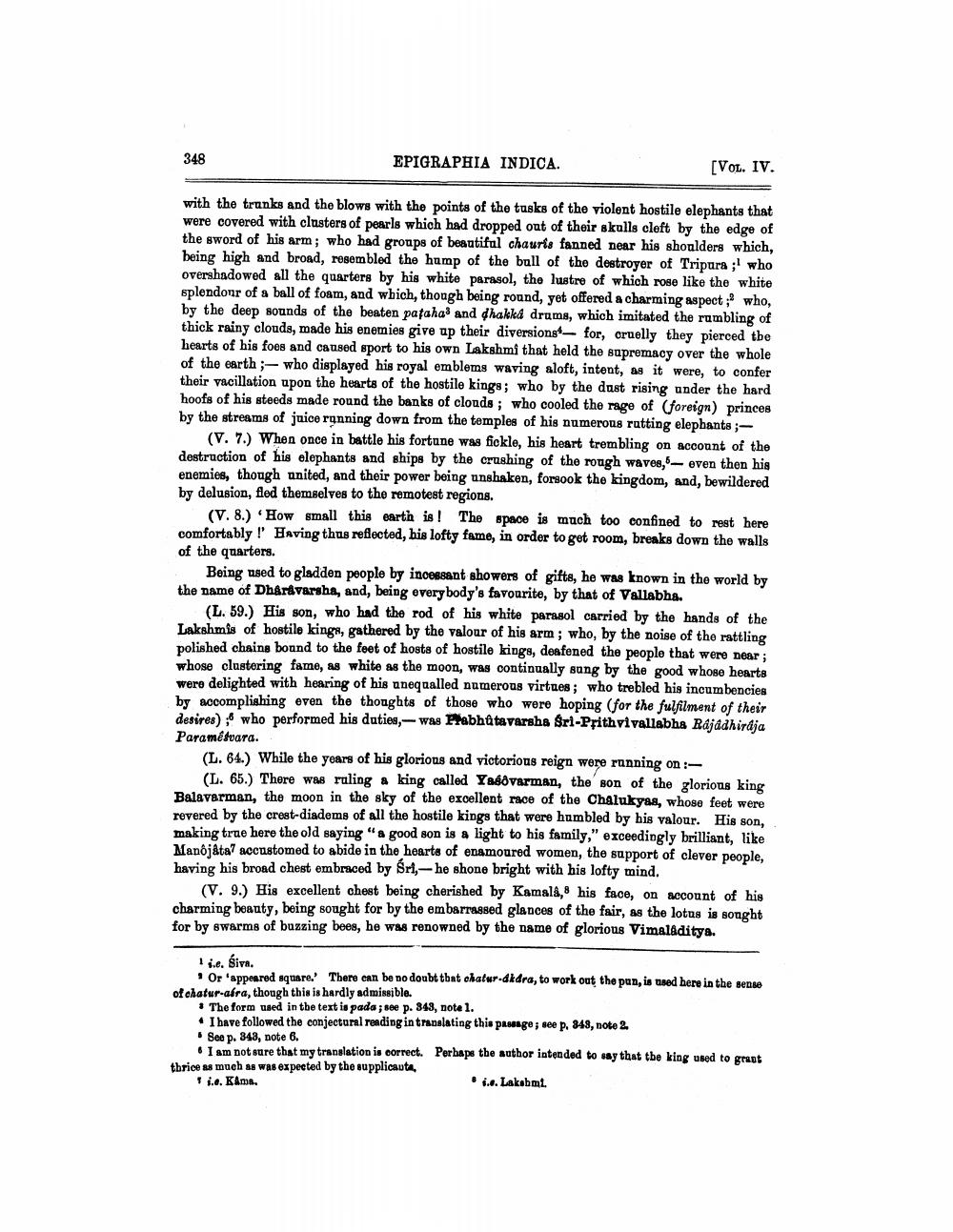________________
348
EPIGRAPHIA INDICA.
[Vol. IV.
with the trunks and the blows with the points of the tasks of the violent hostile elephants that were covered with clusters of pearls which had dropped out of their skulls cleft by the edge of the sword of his arm; who had groups of beautiful chauris fanned near his shoulders which, being high and broad, resembled the hump of the bull of the destroyer of Tripura ;' who overshadowed all the quarters by his white parasol, the lustre of which rose like the white splendonr of a ball of foam, and which, though being round, yet offered a charming aspect; who, by the deep sounds of the beaten patahad and dhakka drums, which imitated the rumbling of thick rainy clouds, made his enemies give ap their diversions - for, cruelly they pierced the hearts of his foes and caused sport to his own Lakshmi that held the supremacy over the whole of the earth ;- who displayed his royal emblems waving aloft, intent, as it were, to confer their vacillation upon the hearts of the hostile kings; who by the dast rising under the hard hoofs of his steeds made round the banks of clouds; who cooled the rage of (foreign) princes by the streams of juice rgnning down from the temples of his numerous rutting elephants ;
(V. 7.) When once in battle his fortune was fickle, his heart trembling on account of the destruction of his elephants and ships by the crushing of the roagh waves, even then his enemies, though united, and their power being unshaken, forsook the kingdom, and, bewildered by delusion, fled themselves to the remotest regions.
(V. 8.) How small this earth is! The space is much too confined to rest here comfortably !' Having thus reflected, his lofty fame, in order to get room, breaks down the walls of the quarters.
Being used to gladden people by incessant showers of gifte, he was known in the world by the name of Dharavarsha, and, being everybody's favourite, by that of Vallabha.
(L. 59.) His son, who had the rod of his white parasol carried by the hands of the Lakshmis of hostile kings, gathered by the valour of his arm ; who, by the noise of the rattling polished chains bound to the feet of hosts of hostile kings, deafened the people that were near; whose clustering fame, as white as the moon, was continually sung by the good whose hearts were delighted with hearing of his unequalled numerous virtues; who trebled his incumbencies by accomplishing even the thoughts of those who were hoping (for the fulfilment of their desires) who performed his duties, was Prabhatavarsha Sri-Prithvivallabha Rajadhiraja Paramédvara.
(L. 64.) While the years of his glorious and victorious reign were running on :
(L. 65.) There was ruling a king called Yafðvarman, the son of the glorious king Balaverman, the moon in the sky of the excellent race of the Chalukyas, whose feet were revered by the crest-diadoms of all the hostile kings that were humbled by his valour. His son, making true here the old saying “a good son is a light to his family," exceedingly brilliant, like Mangjáta accustomed to abide in the hearts of enamoured women, the support of clever people, having his broad chest embraced by Sri,- he shone bright with his lofty mind.
(V. 9.) His excellent chest being cherished by Kamala,' his face, on account of his charming beauty, being sought for by the embarrassed glances of the fair, as the lotus is sought for by swarms of buzzing bees, he was renowned by the name of glorious Vimaladitya.
Tic. śiva.
· Or 'appeared square. There can be no doubt that chatur.dkdra, to work out the pan, is used here in the sense of chatur-abra, though this is hardly admissible.
• The form used in the text is pada ; see p. 343, note 1. • I have followed the conjectural reading in translating this pasage; see p. 348, noto 2
See p. 343, note 6.
. I am not sure that my translation is correct. Perhaps the author intended to say that the king used to grant thrice as much as was expected by the supplicauta + i.e. Káms.
..... Laksbmt.




